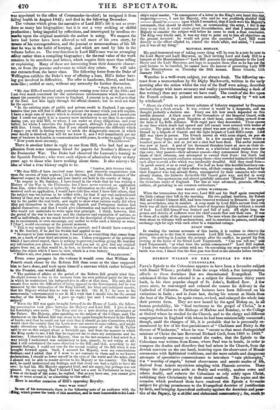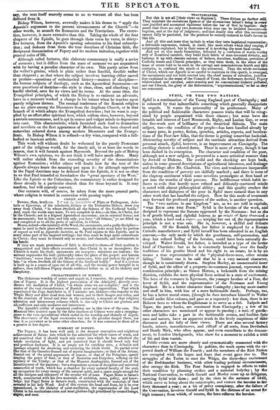BISHOP WILSON Ore THE EPISTLE TO THE COLOSSIANS.
PAUL'S Epistle to the Colossians appears to have been a favourite subject with Daniel Wilson; probably from the scope which a free interpretation affords to those doctrines that are denominated EvangelcaL The celebrated divine first selected it as a subject for discourses thirty years back, in his then popular chapel of St. John's, Bedford Row. A few years since, he rearranged and reduced the course for delivery in the Cathedral of Calcutta. Particular lectures •have been delivered on his visitations in India ; and in June last, during his retreat at Simla from the heat of the Plains, he again recast, revised, and enlarged the whole into their present form. They are now issued by the aged Bishop as, in all human probability, his "final testimony to the gospel of Christ," in a touching dedication to the Bishops of Madras and Bombay, to the College at Oxford where he studied for the Church, and to the clergy and differegt congregations in England with whom he had been ministerially connected; though, amid the changes of life, it is probable that he is personally rer membered by few of his first parishioners of " Clukham and Bisley in the diocese of Winchester," where he was " curate to that most distinguished minister of Christ the 'late Reverend Richard Cecil, from 1801 to 18037 It is scarcely necessary to remind the reader, that the Epistle to the Colossians was written from Rome, where Paul was in bonds, in order to compose the doubts and disorders that had arisen in the Church, from the Jewish converts on the one hand, insisting upon the observance of Mosaic ceremonies with Rabbinical traditions, and the more subtile and dangerous attempts of speculative communicants to introduce "vain philosophy," tl e " worship of angels," formal observances and ascetic modes of life, derived from Asiatic mysticism mingling with Platonic reveries. These things the Apostle puts aside as fleshly and worldly, useless some and others deadly, and exhorts the Colossians to rely solely upon Christ, exhibiting their Christianity by their moral conduct. The topics and the -occasion which produced them have rendered this Epistle .a favourite subject for giving prominence to the Evangelical doctrine of justification by faithrand bringing Apostolical authority against the doctrines and pal- tice of the Papacy, by a skilful and elaborated commentary; for, soot& to gay, the text itself scarcely seems to us to warrant all that has been deduced from it Bishop Wilson, however, avowedly makes it his theme to " apply the Apostle's argument to the present circumstances of the Church"—in other words, to assault the Romanists and the Tractarians. The execu- tion, however, is more extensive than this. Taking the whole of the four chapters of the Epistle, he goes through them verse by verse, in thirty- five lectures, from the Apostle's opening salutation to his final subscrip- tion; and deduces from them the true doctrines of Christian faith, the Scriptural denunciation of Popery and its modern imitation, together with general rules of life.
Although called lectures, this elaborate commentary is really a series
of sermons; it differs from the mass of sermons we are acquainted with by having a peculiar character of its own. This partly arises from the writer's genius, which is plain rather than fanciful, forcible rather than eloquent.; so that where the subject involves learning either sacred Or profane—questions of ecclesiastical history—matters of discipline— the human subjects of theology, such as the Apostolical Succession--or even questions of doctrine—the style is clear, close, and clinching; but 'hardly clerical, save for its views and its terms. At the same time, the Evangelical principles, of which the Bishop is so eminent an advocate, have in a measure worked a change in his nature when he touches upon - purely religious themes. The sensual tenderness of the Romish religion has no place among the Dissenters from the Anglican Church, or in that branch of it which adopts the Evangelical doctrines; but its want is sup- plied by an effort after spiritual love, which seldom rises, however, beyond a certain unctuousness, and is apt in coarse and vulgar minds to degenerate into cant. This characteristic, which furnished such food to dramatists and novelists on the first appearance of Methodism, has been cleared and atenewhat sobered down among modern Dissenters and the Evange- licals. In Bishop Wilson it is refined—a dry wine, compared with a full- bodied or luscious article.
This work will without doubt be welcomed by the purely Protestant part of the religious world, for the timely aid, or at least the words in se820.13, that it will furnish against Maynooth. Beyond the pale of Bishop Wilson's own opinions, we do not think it will have much effect. Many will rather shrink from the exceeding severity of the denunciations against Romanism • whilst others will doubt how far the text of the Apostle always bears the meaning put upon it : for although opposition to the Papal 'doctrines may be deduced from the Epistle, it is not so clear to us that Paul intended to foreshadow the "great apostaey of the West." Like the Epistle to the Colossians, the commentary is rather designed for those already in a particular church than for those beyond it. It may 'confirm, but will scarcely convert,
Our extracts will, of course, be taken from the more general parts, witere religion is treated in connexion with passing topics.
CHRIST ALONE.
t Beware, Then, brethrtn. To. not of Plato or Pythagoras, Aris- totle or Epietetus, of the scholastic divines or the Tridentine fathers, draw you away from Christ, " in whom dwelleth all the fulness of the Godhead bodily." Aid, mark the words once more, Ye are complete in him; in him, in Christ, not fin the Church; not in a feigned Apostolical succession • not in external forms; not s-sacraments; but in him, and him only, you have "till fulness," ye are filled up and completed as to all the parts of salvation, in Christ. Means, indeed—the ministry. of theWord, the sacraments, and a godly discipline- .-aslmt be iised in their place with reverence. Apostolic order must have its portion of regard as well as Apostolic doctrine, as St Paul enjoins in this Epistle, and in every other part of his inspired writings: but they must be kept quite subordinate to Christ; they must be treated only as means, and channels, and instruments in hie hands.
If they are made prominent—if faith is directed to them—if their position is exaggerated and their effects overstated, then Christ is to ns incomplete; the Church is made his rival; sacraments are usurpers; ministers are traitors- the servant supersedes his lord; philosophy takes the place of the gospel; and hirman "traditions," worse than the old Mosaic ceremonies, hide and darken the glory of him"in whom dwelleth all the fulness of the Godhead bodily." And if a system is built up in a course of ages out of all this, and the secular power brought in to enforce, then full-blown Popery stands confessed before us in all its idolatry and blasphemy.
CHARACTERISTICS OF FOPERT.
The idolatrous worship of saints and angels is, I conceive, the grand abomina- tion of Popery. It is the highest provocation of the Almighty, directly over- throws the mediation of Christ, "in whom alone we are complete," and is the tents of the vast circumference of Romish eiio, and superstition. That which constituted the Pope Antichrist is, if i mistake not, idolatry—thetransfer to the Mary and other dead men and women, and to their images and relics, and to e elements of bread and wine in the eucharist, a measure of that religions adoration and intercessory reliance which is due only to Christ our glorious and all-sufficient and only mediator and intercessor.
The Apostle's coarse of argument confirms me in this view of the case. The i
Moeaical rites insisted upon by the false teachers at Colosse were onlya stepping- stone to the vain speculations which ended in the worship and idolatry of angels. The observance of the legal ceremonies was not the peculiar danger there, nor was it so prevalent as in some other churches; for it was common to them all in a greater or less degree.
SITATHARY OF POPERY.
The Papacy, it has been well said, is the deepest conception and mightiest .-achievement of Satan.' into which he has admitted the whole canon of truth, and yet contrived that it should teach only error; into which he has admitted the whole revelation of light, and yet contrived that it should breed only foul and pestilent darkness. It is an ample net for catching men, a delusion and tipndage adapted for deceiving and enslaving the whole world. No partial error ake that of the Gnostics framed out of mystic imaginations; or that of the Arians, framed out of the proud arguments of reason; or that of the Pelagian, openly denying the grace of God; or that of Nestorius and Eutyches, refining on the mystery of the Trinity; or that of the Monster Anabaptists, framed out of the licentiousness of the passions; but a stupendous system of deception and universal tounterfeit of truth, which has a chamber for every natural faculty of the soul, an occupation for every energy of the natural spirit, and a space ample enough for all the mtrigne and chicanery of the secular wit of man. Pagan Rome is Satan's work, constructed with his own materials of ambition, arms, policy, and know- ledge; but Papal Rome is Satan's work, constructed with the materials of God sevealed in his holy Word. And of this system the bead and front, let it be ever remembered, is the idolatry of saint-mediation, the supercession of the Lord Christ in his meritorious cross and mostglorions high priesthood by createdbeinga,
' angels, and men. • • YEACTARIANFAL
But this is not all [their views on Baptism]. These divines go further They maintain the monstrous figment of the unconscious infant's being in every case justified and accounted righteous before the bar of God by baptism : they assert that there are only two moments when man can be declared innocent—in baptism, and at the day of judgment; and that deadly sins after this sacrament cannot fully be pardoned, nor the penitent be entirely restored to God's favour in this life.
And all this and more they include in what they term baptismal regeneration; a defensible expression, indeed, in itself, like most others which they employ, if scripturally explained, but in their sense of it involving the most fatal errors. And yet on this sandy foundation, defended by a confusion of words worthy only of Jesuitical casuists, they build their fabric of man-invented divinity, and buttress it vp with obscure catenas of fathers, doctrines, traditions, pretences of Catholic tenets and Church principles, as they term thew, in the sense of the mass of errors held to be such in the corrupt and demonolotrons fourth and fitit centuries, to confound the minds of the unlearned. Thus the whole mediation of Christ, which our Apostle is so careful to maintain in this epistle, is swamped, the sacraments and not faith erected into the chief means of salvation, justifies tion explained in the sense of the Council of Trent, the Reformers deciM Popery whitewashed and extolled, saint-worship and its concomitant idolatry , and oar Church, the glory of the Reformation, " nnprotestantized," so far as they are concerned.



























 Previous page
Previous page